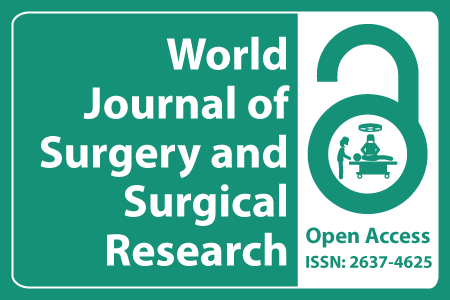
Journal Basic Info
- Impact Factor: 1.989**
- H-Index: 6
- ISSN: 2637-4625
- DOI: 10.25107/2637-4625
Major Scope
- Plastic Surgery
- Obstetrics & Gynecology
- Endocrine Surgery
- Surgical Oncology
- Surgical Procedures
- Otolaryngology & ENT Surgery
- Surgery & Surgical Research
- Laparoscopic Surgery
Abstract
Citation: World J Surg Surg Res. 2018;1(1):1011.DOI: 10.25107/2637-4625.1011
Evaluation of the Factors Affecting the Patency of Arteriovenous Fistulas used for Hemodialysis in End Stage Renal Failure Patients
Eyupserhat Calik, Umit Arslan, Ednan Bayram and Bilgehan Erkut
Department of Cardiovascular Surgery, Atatürk University Medical Faculty, Erzurum, Turkey
Department of Cardiology, Atatürk University Medical Faculty, Erzurum, Turkey
*Correspondance to: Bilgehan Erkut
PDF Full Text Research Article | Open Access
Abstract:
The continuity of vascular access still causes major problems and cost loss in end stage renal failure patients. Many factors may be effective in providing primary arteriovenous fistula patency. We examined the effects of various factors on fistulas in 821 chronic renal insufficiency patients. From 2010 to 2018, 821 arteriovenous fistulas were created by the 2 different cardiovascular surgery clinics (University and Training-Research Hospital) for hemodialysis. The average age of the patients is 57 years (9 to 71 years). Primer patency was described as the time until the patient needed a second surgical procedure. None of the patients had pathology requiring additional surgery. Age, sex, smoking habits, hypertension, diabetes mellitus, malignant history, fistula localization and previous dialysis catheter placement were analyzed. There was no statistically significant difference between the patency rates of the between the upper and lower arm arteriovenous fistulas formed in fistula-created patients. Diabetes mellitus (p=0.0001), hypertension (p<0.0005), smoking habits (p<0.0005), previous catheter placement (p<0.0007) and age (p=0.0008) were found to be factors affecting the primary patency of arteriovenous fistulas. And our results showed that these risk factors affect the fistula patency, negatively
Keywords:
Arteriovenous fistula; Hemodialysis; Fistula patency
Cite the Article:
Erkut B, Calik E, Arslan U. Evaluation of the Factors Affecting the Patency of Arteriovenous Fistulas used for Hemodialysis in End Stage Renal Failure Patients. World J Surg Surgical Res. 2018; 1: 1011.













